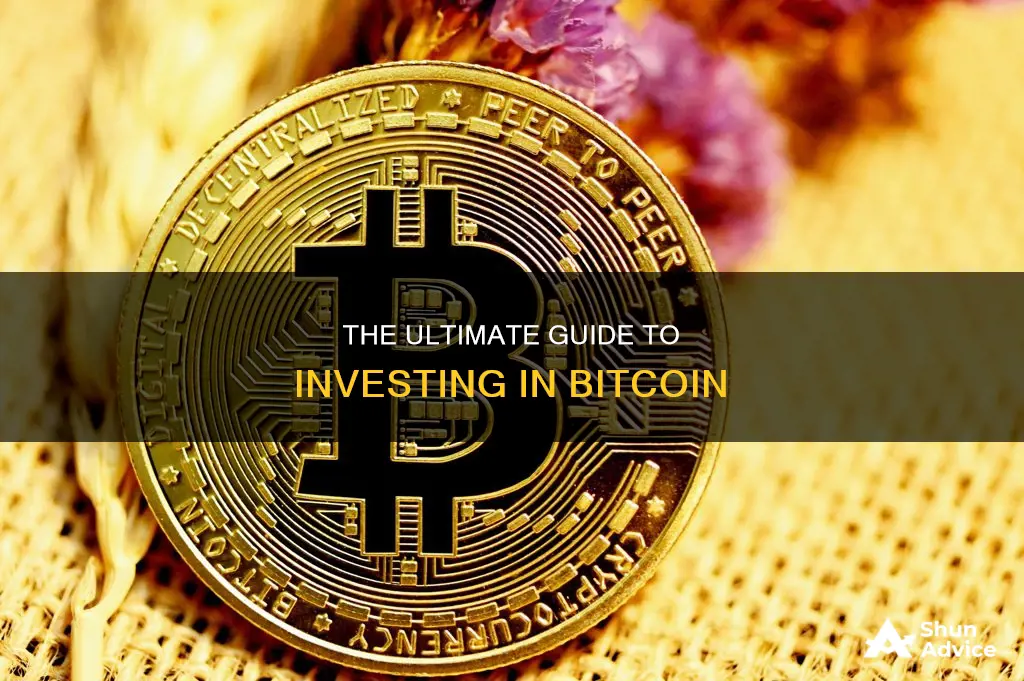
Bitcoin is a cryptocurrency that was created in 2009 by Satoshi Nakamoto. It is a virtual currency that is secured by blockchain technology. Bitcoin is one of the most widely used types of cryptocurrency, with its value having skyrocketed over the years.
If you are looking to invest in Bitcoin, there are a few things you should know. First, you will need to join a Bitcoin exchange such as Coinbase, Binance, or Kraken, and obtain a Bitcoin wallet, which can be a hot wallet or a cold wallet. You will then need to connect your wallet to your bank account and place your Bitcoin order. It is important to note that investing in Bitcoin is very risky due to its high volatility, and you should carefully consider your risk tolerance and investment strategy before purchasing any.
| Characteristics | Values |
|---|---|
| Creator | Satoshi Nakamoto |
| Creation Year | 2009 |
| Use Case | Currency |
| Technology Used | Blockchain |
| Type of Blockchain | Public ledger |
| Security | Cryptography |
| Value | No intrinsic value |
| Price Volatility | High |
| Investment Risk | High |
| Purchase Options | Crypto exchanges, broker-dealers, apps |
| Purchase Amount | Fractions of a single coin |
| Storage Options | Hot wallet, cold wallet |
What You'll Learn

Choosing a Bitcoin exchange
When choosing a Bitcoin exchange, it is important to consider several factors to ensure that you are getting a good deal and that your investment is secure. Here are some key things to keep in mind:
- Reputation and Security: Opt for a well-known and reputable exchange that prioritises security. Given the high value of cryptocurrencies, exchanges are a prime target for hackers. Look for features like two-factor authentication and insurance coverage for losses due to security breaches.
- Selection of Cryptocurrencies: Different exchanges offer different selections of cryptocurrencies. If you are only interested in investing in Bitcoin, this may not be a concern. However, if you want to trade multiple cryptocurrencies, look for an exchange with a wide selection.
- Fees: Transaction fees can vary widely among exchanges. Some exchanges have high fees, while others offer more competitive rates. Be sure to understand all the costs associated with using a particular exchange before signing up.
- Ease of Use: Some exchanges are designed for more advanced traders, while others offer user-friendly interfaces that are ideal for beginners. Choose an exchange that aligns with your level of experience and comfort.
- Payment Methods: Before signing up, check what payment methods the exchange supports. Most exchanges allow you to fund your account with fiat money (e.g. USD) via bank transfer, but some may also accept credit or debit cards.
- Customer Service: Given the volatile nature of the cryptocurrency market, you'll want to ensure that the exchange you choose provides timely and responsive customer support. Check reviews to see what other users have to say about their experience with the exchange's customer service.
- Regulatory Compliance: Cryptocurrency exchanges are subject to regulatory scrutiny, and the rules can vary depending on your location. Make sure the exchange you choose complies with the relevant regulations in your country or region.
- Additional Features: Some exchanges offer additional features like crypto savings accounts, interest on certain assets, or the ability to earn rewards by completing specific activities. If you're looking for more than just basic buying and selling, these features may be worth considering.
- Coinbase: One of the most popular crypto exchanges, Coinbase offers a wide selection of cryptocurrencies and insures losses in the event of a security breach or fraudulent transfers. However, it has high fees unless you use Coinbase Pro.
- Binance: Founded in 2017, Binance has a strong focus on altcoins and offers a large variety of crypto and tokens.
- Kraken: A well-established crypto trading platform that allows margin trading and supports a range of coins and tokens, including riskier options like DOGE.
- Gemini: Launched in 2015, Gemini caters to both casual and veteran Bitcoin investors with different user interfaces and fee structures.
- Uphold: Uphold allows you to trade multiple assets without having to constantly convert back to fiat currency. It offers a simple and transparent pricing structure and supports a wide range of crypto tokens.
A Guide to Investing in Bitcoin Stock in Australia
You may want to see also

Getting a Bitcoin wallet
To get started with investing in Bitcoin, you'll need to get a Bitcoin wallet. A Bitcoin wallet is a place to securely store your cryptocurrency. There are several types of Bitcoin wallets, including hosted wallets, non-custodial wallets, and hardware wallets.
Hosted wallets are the most popular and easy-to-set-up type of crypto wallet. When you buy crypto using an app like Coinbase, your crypto is automatically held in a hosted wallet. It's called hosted because a third party, like a bank, keeps your crypto for you. The main benefit of keeping your crypto in a hosted wallet is that if you forget your password, you won't lose your crypto. However, a drawback is that you can't access everything crypto has to offer.
Non-custodial wallets, like the Coinbase Wallet, put you in complete control of your crypto. Non-custodial wallets don't rely on a third party to keep your crypto safe. While they provide the software necessary to store your crypto, the responsibility of remembering and safeguarding your password falls entirely on you. If you lose or forget your password, there's no way to access your crypto.
Hardware wallets are physical devices, about the size of a thumb drive, that store the private keys to your crypto offline. Most people don't use hardware wallets because of their increased complexity and cost, but they do have some benefits. For example, they can keep your crypto secure even if your computer is hacked.
When choosing a Bitcoin wallet, consider your goals, investment timeline, and risk profile. It's important to do your research and carefully evaluate any wallet before using it to store your crypto. Additionally, pay attention to transaction fees, as these can vary widely among currencies.
The Altcoin Investment Guide: Best Altcoins to Buy
You may want to see also

Connecting your wallet to a bank account
Step 1: Access the "Add Account" Screen
On the All Accounts screen, click on the Add Account box in the list of accounts. If you're accessing this from your dashboard, swipe left until you reach the end of your accounts. Swipe left once more to see the "Add Account" screen.
Step 2: Select "Bank Sync"
To add a bank-connected account, select Bank Sync. This will allow you to link your bank account to your wallet.
Step 3: Enter Your Bank Details
Type your bank's country and name in the search field. If you cannot find your bank, you may need to submit a request for integration. Select your bank from the drop-down field.
Step 4: Log in to Your Bank Account
Enter your login credentials to access your bank's site. Depending on your bank, you may need to answer additional security questions.
Step 5: Choose Your Account
Select your account from the provided options.
By following these steps, you will be able to connect your bank account to your wallet, making it easier to manage your finances and transactions. Remember to keep your login credentials secure and ensure that you are using a trusted platform to protect your sensitive information.
The Ultimate Guide to Investing Bitcoin in Coins.ph
You may want to see also

Placing your Bitcoin order
To place your Bitcoin order, you can use a cryptocurrency exchange. Here is a step-by-step guide:
Choose a Cryptocurrency Exchange
Select a reputable, well-known exchange with a large selection of currencies. Examples include Coinbase, Binance, and Gemini.
Create an Account
Provide your personal information and verify your identity to complete the registration process.
Fund Your Account
Before buying any cryptocurrency, you need to deposit funds into your exchange account. You can fund your account with fiat money, such as U.S. dollars.
Decide on the Cryptocurrency
Research and decide on the cryptocurrency you want to buy. In this case, you would select Bitcoin.
Place a Buy Order
Follow the steps required by the exchange to submit and complete a buy order. Specify the amount of Bitcoin you want to purchase, and choose whether to place a market, limit, or stop order.
- A market order will execute immediately at the best available current market price.
- A limit order lets you set a minimum price for the order to execute—it will only execute at this price or higher.
- A stop order lets you specify the price at which the order should execute. If the price reaches this point, your order will trigger a sell.
Store Your Bitcoin
After your purchase, you will need to store your Bitcoin in a digital wallet. This wallet can be hosted by the cryptocurrency exchange or an independent wallet provider.
Understanding Bitcoin: Owning vs. Investing
You may want to see also

Managing your Bitcoin investments
- Diversification: It is generally recommended that you diversify your portfolio and not allocate more than 5%-10% of your net worth or investment portfolio to Bitcoin or other risky assets. This helps to spread out the risk and protect your finances in case of significant price swings or market downturns.
- Storage Options: You will need a digital wallet to store your Bitcoin. There are two main types: hot wallets (online wallets provided by crypto exchanges or software providers) and cold wallets (offline encrypted devices). Hot wallets are more susceptible to hacking, so choosing an insured and well-regulated provider is crucial. Cold wallets offer better security but are easier to lose, so consider your priorities when deciding.
- Security Measures: To protect your Bitcoin investments, always use strong passwords, two-factor authentication, and safe browsing practices. Keep your private keys secure and separate from your public addresses, especially if you use a hot wallet. Additionally, be cautious when accessing your wallet or exchange account on public networks or unfamiliar devices.
- Transaction Fees: When buying or selling Bitcoin, pay attention to the transaction fees charged by exchanges or brokers. These fees can vary widely and impact your overall profits. Also, be cautious when using credit cards to purchase Bitcoin due to the associated processing fees and interest charges.
- Tax Implications: Understand the tax consequences of buying, selling, or spending Bitcoin. In many countries, cryptocurrencies are taxed as capital gains or property, and you may need to report any profits or losses to the appropriate authorities. Consult with a tax professional to ensure you comply with the relevant regulations.
- Long-Term Strategy: Bitcoin investing can be highly volatile, and day trading may not be suitable for everyone. Consider adopting a long-term investment strategy that aligns with your financial goals and risk tolerance. Remember that Bitcoin's value is based on its potential as a payment system and its finite supply, so think carefully about your investment horizon.
Smartly Diversifying Your Crypto Portfolio: How Many Coins?
You may want to see also
Frequently asked questions
You can buy Bitcoin through a crypto exchange or a broker. You will need to set up an account, verify your identity, and link your bank account to fund the purchase.
Some of the most popular crypto exchanges are Coinbase, Binance, Kraken, Gemini, and Bitfinex.
A Bitcoin wallet is where you store your cryptocurrency. There are two types of wallets: hot wallets and cold wallets. Hot wallets are provided by your crypto exchange or a third-party provider and can be accessed via the internet or a software program. Cold wallets are physical hardware devices that store your coins, similar to a flash drive.
This depends on your risk tolerance and investment strategy. Some coins cost thousands of dollars, but exchanges often allow you to buy fractions of a single coin, so your initial investment could be as low as $25.
No investment is inherently "good" or "bad". It depends on your risk tolerance, investment strategy, and financial goals. Bitcoin is a very high-risk investment due to its volatile nature. Its value may rise or fall dramatically over a short period, and it is not backed by any physical asset or central regulator.







